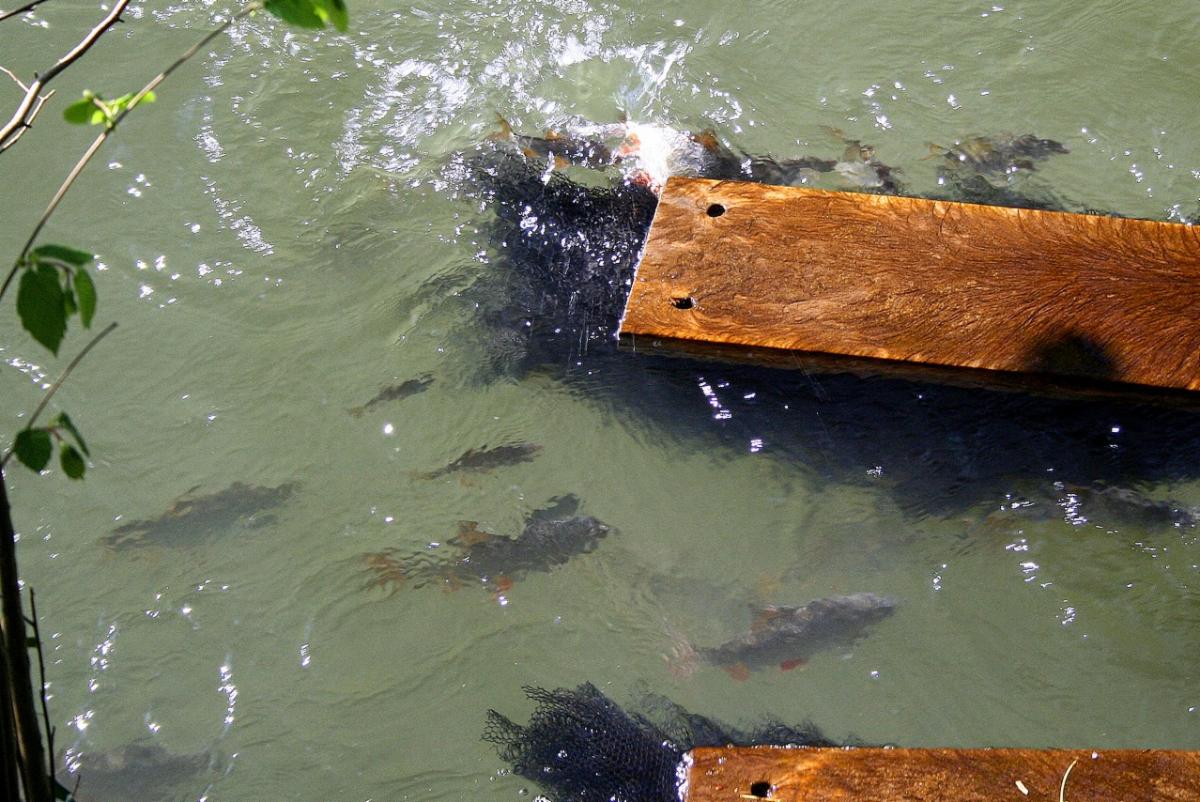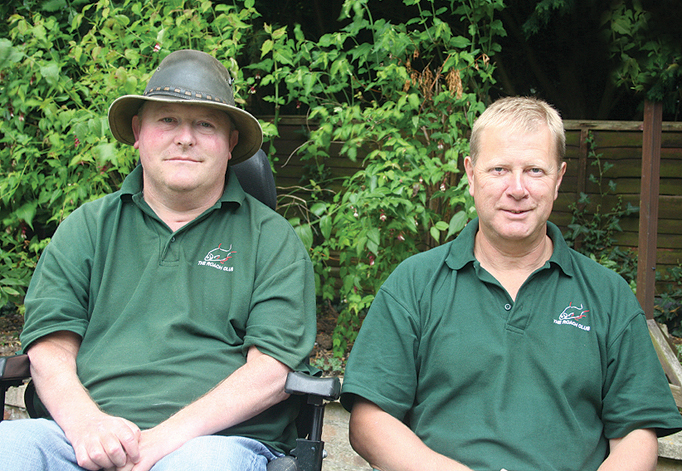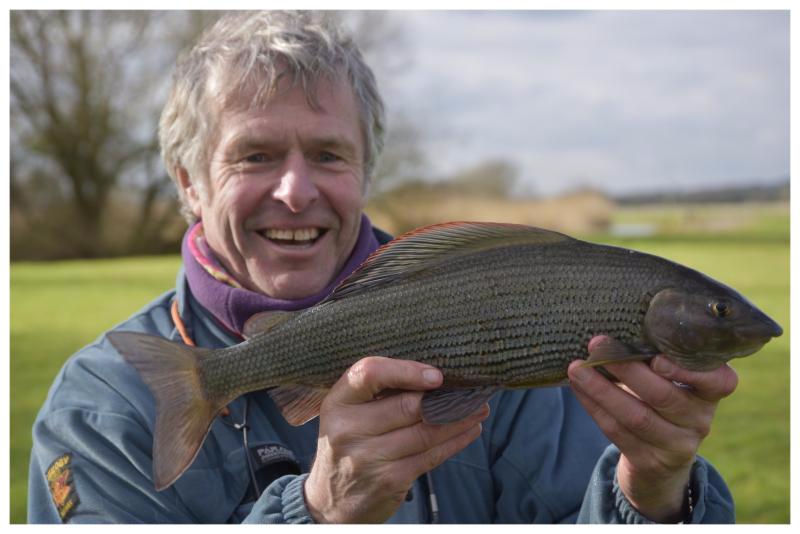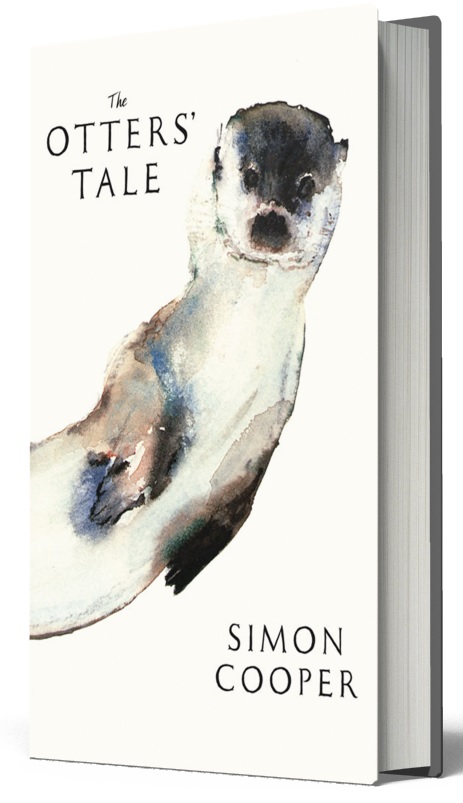Great things by good people
After 15
years the Avon Roach Project, dedicated to restoring the roach to the middle
reaches of the Hampshire Avon, is shutting up shop. But this is, contrary to
what you might anticipate, a cause for celebration. And the chance to pay
tribute to the work of two amazing guys. Let me take you back a while.
|
|
 |
|
|
The Common Roach (Rutilus rutilus)
|
In 2005 the
Environment Agency conducted a survey of fish stocks on the thirty mile stretch
of the Avon from Salisbury downstream to Christchurch, just before it reaches
the English Channel. It confirmed what regular match anglers had long suspected
- the roach population was crashing catastrophically. A combination of weed
cutting, floods, pollution and cormorant infestation had bought us to the point
where the roach population was no longer self-sustaining. In a few years the
roach would become effectively extinct on a river where it once reigned
supreme.
But two
Avon regulars, Trevor Harrop and Budgie Price had other ideas. Frankly the
situation was too far gone for something as simple as habitat improvement.
Restocking was the only answer. Now the easy way might have been to raise some
funds to buy in commercially reared roach. But this wasn't exactly what Trevor
and Budgie had in mind. Yes, this might save roach on the Avon, but it would
not be saving the Avon roach.
So, with no
experience of fish farming but a germ of an idea Budgie and Trevor, after a few
misfires, came up with as Baldrick would say, a cunning plan. They scoped out
the prime roach sites that remained on the Avon and just prior to the spawning
season tethered spawning boards in the river.
|
|
 |
|
|
Spawning boards in the River Avon
|
These
homemade devices are essentially three-foot floating planks of wood that have
fine gauge mesh arranged in ruffles on the underside, which the roach take for
the river weed Willow moss, their preferred aquatic vegetation for
spawning, around which the competing males gather until they are joined by the
females. The plan was helped by three roach attributes, two natural and one
learnt. Firstly, roach are great creatures of habit returning to the same
spawning site each year. Secondly, they came to prefer the 'artificial' weed to
the real thing. And finally, each female releases up to 100,000 fertilised eggs
so there was plenty of raw material to be harvested. The boards were then
gathered up and taken to fry tanks in Trevor's garden where they would spend
the next year.
This might
be a moment to ask why? Does the Avon roach really matter? Well, I suppose in
itself maybe not but in the wider ecological balance of English nature it does.
And it tells us something about how we care, or more accurately don't, for our
rivers; of all freshwater fish the roach is the most tolerant of polluted
water. Mother Nature has a pecking order, what biologists like call the food
chain. It is balanced and organised, evolved over centuries. It is the original
Jenga tower of co-dependence. You can keep pulling away the pieces one by one
but eventually, however careful you think you might be, the whole edifice will
collapse.
Back to
Trevor's garden, which, however commodious, was no place for a growing roach
but fortune arrived in the form of Jac Sykes, who offered our pair the free use
of some disused trout stews at Bickton Mill. Here the roach would spend the
next two years and on reaching sexual maturity at three would be returned to
the adjacent River Avon in early spring to spawn themselves just five weeks
later.
After
twelve years of this annual ritual Budgie and Trevor are all but done. The Avon
Roach Project has been a huge success. The population is restored, perhaps not
to the same level as in those wonder years, but certainly to a point where
their numbers are self-sustaining. Anglers regularly catch 50-60 in a day.
Trotting for roach, the most exulted form of coarse fishing, on the Avon is no
longer a fool's errand; best in a generation plenty are saying. So, as Trevor
says the fish he loves are now 'on their own'. The Bickton stews will be
gradually wound down over the next two years until the last of the stock are
returned to the river.
|
|
 |
|
|
Budgie Price & Trevor Harrop
|
It is a job
well done. A tribute to not only Budgie, Trevor and all the supporters of the
Avon Roach Project but living proof that we can pull back from the brink. And
it doesn't need to be complicated. Expensive. Or require global grandstanding
from politicians and activists.
Good
people, away from the limelight, can do great things.
The You
Tube video about the project released a week ago has already had
25,000 views. It is 17 minutes long, the first 7 minutes covering the project
itself.
The Fishing
Cast
I have
teamed up with my old friend Charles Jardine to bring you The Fishing Cast, our
distinctive monthly podcast.
 Recorded in
what used to be the Fishing Breaks office at Nether Wallop Mill, but now the
room we grandly call the riverside studio, we'll be bringing you views, news
and gossip from the world of fly fishing. You will be welcome to chime in after
each episode (the plan is the last Thursday each month) via social media (or
old-fashioned email if you wish ...) and in time we hope to have guests join us.
Recorded in
what used to be the Fishing Breaks office at Nether Wallop Mill, but now the
room we grandly call the riverside studio, we'll be bringing you views, news
and gossip from the world of fly fishing. You will be welcome to chime in after
each episode (the plan is the last Thursday each month) via social media (or
old-fashioned email if you wish ...) and in time we hope to have guests join us.
The
February edition is now live. We celebrate Howard Croston's
recent World Fly Fishing Championship success, the first British victor since
2007. Charles asks is his victory in Tasmania something to celebrate or are
there downsides? I reveal the results of my Angling Attitudes Survey on catch
and release with some surprising results. And as we enter the last month of the
grayling season we ask: grayling fishing. Curse or saviour?
The Fishing
Cast should be available via your normal podcast provider or listen directly
via our dedicated web site. Happy listening and do give us your
feedback.
2-for-1
with John Bailey
|
|
 |
|
|
John with one of his more modest catches
|
Join John
Bailey for his one-day grayling masterclass on the River Frome which last year
resulted in a new British record.
I think we
can be fairly sure that that particular lightning bolt won't strike again, but
you never know. The fish went back unharmed. And John knows the exact spot and
seam of water. The day is on Special Offer as a 2-for-1.
The cost is
£325 for two on Friday February 21st or Saturday February 22nd.
Details
and booking form here ....
Following up
For all its
downsides the internet is the ultimate connector. The electronic strands
uniting us fly fishers despite the diverse and far flung nature of what you
might call our community. This Newsletter is just one tiny part of that
ever-expanding web but it still never ceases to amaze me the nooks and crannies
of memories it jogs. Take for instance the last edition The love of
mistletoe.
Writing about the poplar trees that were planted half a century
ago for match production I wrote, "The promise of cash-for-trees is as
long forgotten as the souls who planted them." How very wrong I was as
within a day an email came my way from the very man (and a Fishing Breaks
regular) who had planted the trees all those decades ago.
|
|
 |
|
|
John
Simms
|
And then if that was not enough a couple of days later another
email about the fishing exploits of ex-Chairman of the US Federal Reserve Paul
Volker who had died just before Christmas. He was a regular visitor to Jackson
Hole in Wyoming, which is one of the great fly fishing destinations out West
and, coincidentally (!) the venue for the annual Economic Symposium of
prominent central bankers. In response to my piece came this:
Dear Simon,
Interestingly, I was
privileged to be Paul Volker's guide while he was here in Jackson Hole for
meetings with bankers to discuss the fact that the prime interest was
incredibly high at 19% as I recall.
We had a great time on
the river, and he said something about literally unwinding and finally
relaxing.
Prime rate started
dropping that Monday! Paul sent me handwritten personal letter
practically giving me credit for lowering the prime rate!
Fortunately, I still
have the letter..........
Best Regards,
John Simms
I believe this is the same John Simms who founded Simms Fishing
Products in Jackson back in 1980. Unfortunately, when I have tried to reply to
John the email address comes back Return to Sender. John, if you are reading
this do get in touch again. I'm sure we'd all like to hear more about the day
 The
Otters' Tale: How Otters Returned to Hampshire
The
Otters' Tale: How Otters Returned to Hampshire
I'll be
returning to the village of my teenage upbringing in February to give an
evening talk on The Otters' Tale: How Otters Returned to Hampshire.
It is
actually a fundraiser for the Cheriton village church St Michael's in which the
talk is held, just a mile downstream from the source of the River Itchen.
The cost is
£15 a head, including a glass of wine. 175 tickets are already sold so if you'd
like to come get in quick as this particular house of God has a finite
capacity.
Quiz
No theme
this week other than tangentially the Newsletter topics. As ever the quiz
is just for fun, with answers at the bottom of the page.

1)
The
British roach record stands at:
A) 1lb 13oz B) 2lb 7oz C) 4lb 4oz D) 7lb 1oz
2)
In
what year was the word 'podcast' invented?
3)
What
is an Oxford comma?
Have a good
weekend.
Best
wishes,
Simon Cooper simon@fishingbreaks.co.uk
Founder & Managing Director
Answers:
1)
4lb 4oz
2) 2004 by The Guardian
columnist and BBC journalist Ben Hammersley who merged iPod+broadcast
3) The Oxford comma (also known as a serial comma or the Harvard
comma) is used in a list of three or more items, placed between the conjunction
and the final item on the list. Some say it should have been used on the latest
commemorative 50 pence coin.

No comments:
Post a Comment